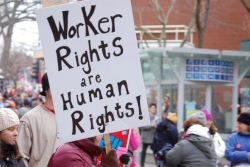Globalisation: Undermining or enhancing labour standards?
Breadcrumb
13:00 - 13:00, 28 October 2016
Blavatnik School of Government, Radcliffe Observatory Quarter, Woodstock Road, Oxford OX2 6GG
 This event is hosted by the Blavatnik School of Government and the Global Economic Governance Programme.
This event is hosted by the Blavatnik School of Government and the Global Economic Governance Programme.
Rising inequality is leading many to question the merits of globalisation. Some argue that ever-greater economic integration, including through free trade agreements, leads to a ‘race to the bottom’ among competitor countries, reducing the welfare of workers, their working conditions and job security. Others contend that global integration is vital for increasing labour standards as it increases economic growth and creates jobs. These issues are being hotly debated in the wake of the Brexit vote in the UK, in the US Presidential election campaign, and in many developing countries.
This panel brings together experts to delve behind the headlines, share their research findings, and discuss the policy options that governments can take to improve labour standards. When does economic integration raise or lower labour standards? What policy measures should governments take? Should other countries follow the recently agreed Trans-Pacific Partnership (TPP) Agreement, which contains most stringent labour provisions of any free trade deal to date?
Chair
Tom Hale, Associate Professor, Blavatnik School of Government
Panellists
Professor Alan Bogg, Professor of Labour Law, University of Oxford
Professor Sandra Fredman, FBA, QC, Rhodes Professor of the Laws of the British Commonwealth and the United States, University of Oxford
Dr Nghia Pham, Global Leaders Fellow, Univeristy of Oxford
